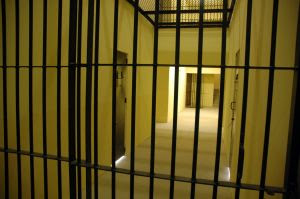
Tonight I attended the inaugural fundraising dinner for the newly-established
Mississippi Innocence Project. Originally a branch of the Innocence Project in New Orleans, the MIP is now housed at the
University of Mississippi School of Law in Oxford, Mississippi. (The national Innocence Project's website is located
here.) I have not had much time to reflect on the event as of yet, so this post is essentially a recounting of my observations from the evening. Not a news report
per se, but also not an opinion piece. Something in between, I suppose.
I attended the dinner for two reasons. First, as I have stated before on this blog, I am the faculty adviser for the Mississippi College School of Law's student-run Public Interest Law Group (PILG). Second, I attended because Mississippi is badly in need of public interest law support. It's a poor state with a relatively high crime rate and a wide gulf between the haves and the have-nots. So organizations like the MIP need support and assistance from entities like PILG and my law school.
Tonight's keynote speakers were Mississippi author
John Grisham and Chicago author
Scott Turow. They were eloquent, witty and passionate, which is no surprise--but the evening's most moving speakers were
Dennis Fritz of Oklahoma and
Cedric Willis of Mississippi, two men wrongfully convicted of separate crimes. Fritz and Willis each served 12 years in prison before being exonerated and released. Willis's mother also was there, sitting at a table near me.
Grisham and Turow related how they became involved in Innocence Project activities--Grisham through his writing and Turow through his law practice. Grisham's 2004 nonfiction book
The Innocent Man details the story of one man's wrongful conviction. Turow, who continues to practice with the Chicago law firm of Sonnenschein, Nath & Rosenthal, represented defendant
Alejandro Hernandez in the infamous
Jeanine Nicarico case. Grisham and Turow spoke of wrongful convictions and the dangers of certain types of scientific evidence (junk science), eyewitness testimony, and use of informants for testimony. Nothing new there, perhaps, but after all the purpose of the evening was not to present cutting-edge testimony, but rather to raise money and garner support for the cause. And given that there was a crowd of about 500 paying guests, that goal was accomplished. Not bad for an organization that is only 2 months old.
I was particularly struck by the contrast between Willis and Fritz. Willis, who is now about 32, was 19 when he was arrested and convicted. His overwhelming emotion on display was joy--joy at being free, at being proven right, at seeing something like the Innocence Project take hold in his home state. Fritz was a more conflicted figure, with compassion, anger, and sorrow on display, sometimes all at once. And who could blame him, really. It does make you ask yourself how you might react to--and indeed how you might survive--12 years of incarceration. It is one thing to hear about wrongful convictions, or to concede the logic that a system based on reasonable doubt can make egregrious errors. It is quite another to meet people who have been wrongfully convicted and hear their stories.
For me, one occurrence put tonight's event in perfect perspective: I said hello to Scott Turow and had no idea who he was. Didn't recognize him. Now, I know what Scott Turow looks like. I've seen the man before, and I have seen his picture scores of times. And I went to law school in Chicago, where he is a bit of a celebrity. To be fair, he had a beard tonight, which he did not use to have. (Check out his
website, on which he is cleanshaven.) But still. There I am, holding the door for famous author Scott Turow, and instead of introducing myself and trying to make a connection I just say, "Hey, how's it going?"
So much for my big moment. And so much for eyewitness testimony.
 So after a very busy April and de facto blog holiday (blogiday?), I'm back to posting. Among other things, I will be taking a group of law students to Seoul, Korea to study this summer. That will be a lot of fun and the source of posts over the summer. But today's topic is something I have posted on in the past: law school debt and the College.
So after a very busy April and de facto blog holiday (blogiday?), I'm back to posting. Among other things, I will be taking a group of law students to Seoul, Korea to study this summer. That will be a lot of fun and the source of posts over the summer. But today's topic is something I have posted on in the past: law school debt and the College. Tonight I attended the inaugural fundraising dinner for the newly-established
Tonight I attended the inaugural fundraising dinner for the newly-established 
